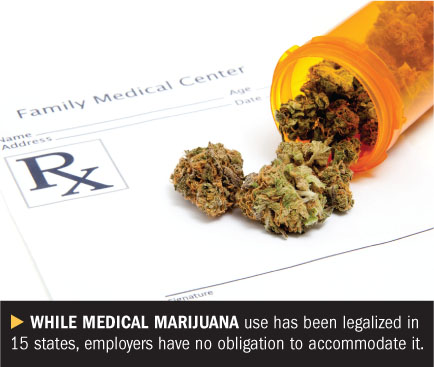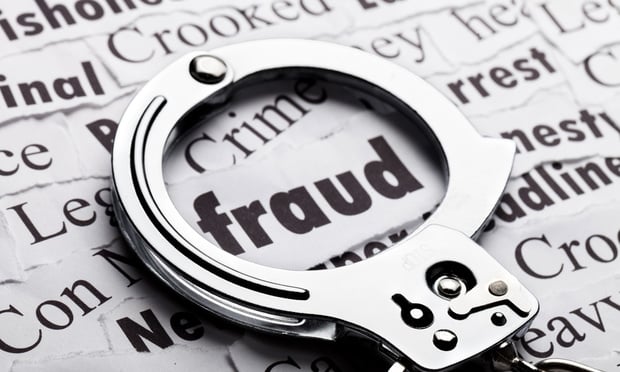 Medical marijuana can be used under approved circumstances in 15 states. On the federal level, the Justice Department says it will not prosecute permitted users or raid medical marijuana dispensaries.
Medical marijuana can be used under approved circumstances in 15 states. On the federal level, the Justice Department says it will not prosecute permitted users or raid medical marijuana dispensaries.
All good news for medical-marijuana users—until they attempt to get or keep a job. Because the courts, to date, have been clear: Employers have no obligation to accommodate medical marijuana use.
Since none of the state laws legalizing medical marijuana use contain any language regarding employment discrimination, "every court ruling thus far on the matter has been positive for employers," says Richard Meneghello, managing partner of Fisher & Phillips in Portland, Ore., a state where medical use of marijuana is legal.
Last year the Oregon Supreme Court ruled employers are not required to keep medical marijuana users on the payroll. In 2008 a similar decision came out of the California Supreme Court. Most recently, a district judge in Michigan upheld Walmart's decision to fire an employee who was using the drug to alleviate symptoms of cancer.
"Nothing has been found that limits the right of an employer to say 'We don't want you,'" says Mark Stephenson, partner at the insurance-focused law firm Nelson Levin deLuca and Horst.
(One potential twist is that the rulings so far have addressed only private-sector employees, not public-sector workers, points out Robert Chadwick, of Campbell & Chadwick in Dallas.)
Beware of Pot Holes
Despite the law being on their side when it comes to hiring and firing, employers are being advised to close all the doors leading to any chance of liability that can surface from employing a medical marijuana user. Attorneys recommend employers revisit internal drug policies, which should already be in place, to make sure intolerance for medical-marijuana use in the office is clear.
Should employers choose to keep a medical-marijuana user on staff after finding out about usage, the employee becomes an enormous liability, the attorneys say. Plaintiffs won't look to the state law; they will look at the federal law.
"If a forklift driver who uses is involved in an accident and hurts someone, you're on the hook. The risk associated with allowing a worker with medical marijuana in [his/her] system to stay at work is not a risk I would endorse taking," says Chadwick, a member of the Professional Liability Underwriters Society.
"There is a real tension happening here. There is no consensus on the issue of [marijuana-induced] impairment," adds Stephenson.
Additionally, it is not known whether an insurer will cover the errors and omissions of an employee under the influence of marijuana. "So employers need to be careful," Stephenson says.
Joint Action: States Stepping In
Those seeking protections for marijuana-using employees are attempting to deal with the setbacks in court by changing state law. Bennett Pine, chairman of Anderson Kill & Olick's employment and labor group, says the judges who have heard these cases have offered some guidance in their rulings for those seeking relief.
"It seems [the courts] are saying that—as of today—employers are protected, but to get the results you, the plaintiffs, are looking for, you have to seek to have the laws modified,'" Pine says.
 And at least one state has pending legislation, and advocacy groups are stepping up their efforts to secure legal protections.
And at least one state has pending legislation, and advocacy groups are stepping up their efforts to secure legal protections.
California Sen. Mark Leno, D-San Francisco, introduced a bill (SB 129) this year meant to make it unlawful for an employer to discriminate against a person based on his or her status as a qualified medical-marijuana user.
The bill would not make it illegal to fire an employee for use on the company's property. It also exempts certain professions, such as school bus drivers, health care providers and heavy-equipment operators, from protection under the proposed law.
Medical-marijuana advocacy group Americans for Safe Access, which helped bring an appeal to the California Supreme Court, says the law in legalizing medical use was "never intended to force law-abiding patients out of a job."
"Why must hundreds of thousands of Californians be denied their civil rights, and be forced to live with the risk of losing their job, due to their choice of medication?" asks Don Duncan, director of the group, in a statement after the bill was introduced.
The American Civil Liberties Union will appeal the Walmart case in Michigan for what it calls the wrongful firing of employee Joseph Casias, who the ACLU says never used on the job and was never under the influence while working.
"The choice between adequate pain relief and gainful employment is an untenable one that no patient should ever be forced to make," ACLU staff attorney Scott Michelman says in a statement made following the ruling.
Want to continue reading?
Become a Free PropertyCasualty360 Digital Reader
Your access to unlimited PropertyCasualty360 content isn’t changing.
Once you are an ALM digital member, you’ll receive:
- Breaking insurance news and analysis, on-site and via our newsletters and custom alerts
- Weekly Insurance Speak podcast featuring exclusive interviews with industry leaders
- Educational webcasts, white papers, and ebooks from industry thought leaders
- Critical converage of the employee benefits and financial advisory markets on our other ALM sites, BenefitsPRO and ThinkAdvisor
Already have an account? Sign In Now
© 2024 ALM Global, LLC, All Rights Reserved. Request academic re-use from www.copyright.com. All other uses, submit a request to [email protected]. For more information visit Asset & Logo Licensing.








